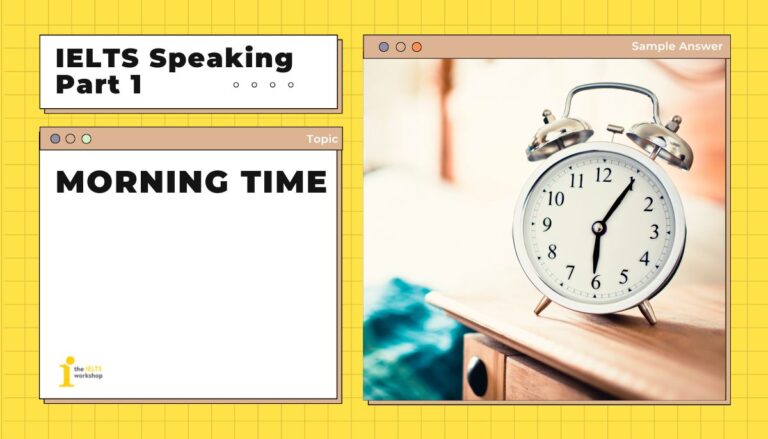Dưới đây là bài mẫu cho chủ đề Morning Time trong IELTS Speaking Part 1 do thầy Nam Việt, cô Phương Duyên và cô Khánh Minh từ The IELTS Workshop gợi ý. Cùng tham khảo một vài cách diễn đạt ghi điểm cho chủ đề này nhé.
Câu hỏi IELTS Speaking Part 1 Morning Time
1. Do you like getting up early in the morning?
2. What do you usually do in the morning?
3. What did you do in the morning when you were little? Why?
4. Are there any differences between what you do in the morning now and what you did in the past?
5. Do you spend your mornings doing the same things on both weekends and weekdays? Why?
6. Do you have the same morning routine everyday?
7. Do you usually eat breakfast at home?
8. Is breakfast important?
Câu trả lời IELTS Speaking Part 1 Morning Time
1. Do you like getting up early in the morning?
Sample 1: As much as I would want to say yes, I’m going to have to admit being an early bird is not my cup of tea. I typically work late at night so I have unfortunately grown accustomed to waking up at around 9 to 10 o’clock in the morning.
- Admit (v): thừa nhận
- Early bird (n): người hay dậy sớm
- (tobe) not my cup of tea (slang/idiom): không phải sở thích, không hay làm
- (Grown) accustomed to (adj): dần trở nên quen với
Sample 2: Yes, I’m an early bird, so I’m used to waking up when the clock strikes 5. Usually, I kick my day off with a glass of warm water to rehydrate myself after seven hours of sleep, and a cup of coffee to refuel my energy for the day ahead.
- early bird: người hay dậy sớm
- when the clock strikes 5: lúc 5 giờ
- kick my day off: bắt đầu ngày mới
- rehydrate: cấp nước
- refuel my energy: cung cấp năng lượng
Sample 3: Yes, given that I’m a morning person, waking up l gives me a sense of productivity and allows me to have some quiet time before the day gets busy. I find that I can accomplish more in the mornings when my mind is fresh. However, getting up early has been challenging for me recently because I haven’t had enough sleep, so I’m trying to go to bed at a reasonable hour.
- my mind is fresh: đầu óc tỉnh táo
2. What do you usually do in the morning?
Sample 1: The first thing I do when waking up is to get a fresh cup of coffee, as my father usually says “Once you wake up and smell a cup of Joe, it’s hard to go back to sleep”. The next item on the list is always checking my emails and notifications before finally getting dressed and heading out, normally at around 11 AM.
- A cup of Joe (slang/idiom) = a cup of coffee (n): một cốc cà phê
Sample 2: In the mornings, I usually start my day by drinking a glass of water mixed with apple cider vinegar, and then doing some light stretching exercises. This has become kind of an indispensable ritual for me since I found out that doing this helps me a lot with digestion and does wonders for my overall health. After that, I have a light breakfast with avocado or eggs while listening to podcasts or some music.
- indispensable ritual: nghi thức không thể bỏ qua
- does wonders for: cải thiện tuyệt vời
3. What did you do in the morning when you were little? Why?
When I was a kid, waking up in the morning was always a hustle because I had to be up and about very early to prepare for school, but because of my lovely mother, who somehow always managed to wake up before me to prepare my breakfast and to help me with my school bag and clothes, I’d never been late to school.
- Hustle (n): sự chen lấn, hoạt động hối hả
- (tobe) up and about (slang/idiom): thức dậy tỉnh táo
4. Are there any differences between what you do in the morning now and what you did in the past?
Sample 1: Yes, of course. Having a full-time job that starts at 1 PM and not having to go to school every day are the two main factors that have allowed me to be more rested in the morning. Though I would love to shift my schedule to be one or two hours earlier to make time for some exercises.
- Shift (v): dịch chuyển
Sample 2: Back in the day when I was a high school student, my morning habit just revolved around preparing school stuff and uniform. But now, there is a major change in my morning routine. At present, I try to squeeze in more time in the morning to do some stretches, sit down to a healthy meal, and map out goals I want to accomplish that day.
- revolve around: xoay quanh
- squeeze in more time: tranh thủ thời gian
- do some stretches: tập thể dục
- map out: lên kế hoạch chi tiết
5. Do you spend your mornings doing the same things on both weekends and weekdays? Why?
On weekends I usually get up a bit earlier. My schedule is the odd one out compared to my friends because most of them just have a normal 9 to 5 job, so Sunday morning is the only time that we can spend with each other.
- The odd one out (slang/idiom): thứ khác biệt (so với những thứ khác)
6. Do you have the same morning routine everyday?
On busy days, when I have to run errands, I often bounce out of bed when the sun comes up and do everything swiftly. But on the weekend, when I have more time to spare, I often catch up on missed sleep and enjoy a leisurely start.
- run errands: chạy việc vặt
- bounce out of bed: nhảy khỏi giường
- have more time to spare: nhiều thời gian rảnh
- catch up on missed sleep: ngủ bù
- leisurely: không vội vã
7. Do you usually eat breakfast at home?
Of course. When making breakfasts from scratch, I can have more control over ingredients and portion sizes suitable for my diet. That means I can make sure it’s lower in calories and more nutritious than meals served up in restaurants. But on hectic days, I must resort to grabbing fast food on my way to work.
- from scratch: từ đầu
- on hectic days: ngày bận rộn
- resort to: đành phải
8. Is breakfast important?
Opinions may vary, but I believe breakfast is very important. It gives me the energy I need to start my day and helps me concentrate better on my tasks. When I skip breakfast, I often feel tired and find it harder to focus. That said, you need to keep it light. I find that a big breakfast leaves me feeling drowsy and lethargic.
- Drowsy: buồn ngủ
- Lethargic: chây lười
Trên đây là bài mẫu IELTS Speaking Part 1 chủ đề Morning Time. Ngoài ra, bạn cũng có thể truy cập Kho bài mẫu Speaking của TIW để tham khảo câu trả lời mẫu cho nhiều chủ đề khác nữa.
Tham khảo phương pháp xây dựng câu trả lời IELTS Speaking tại khóa học Pre-senior của The IELTS Workshop.









